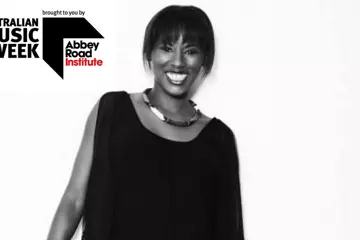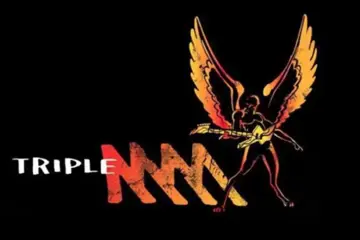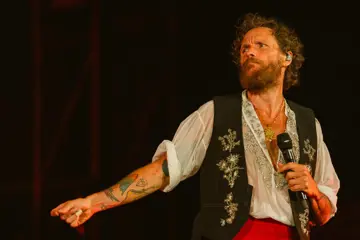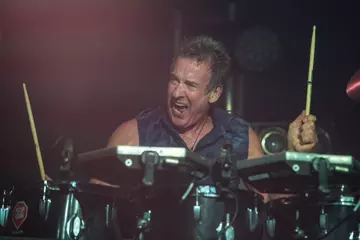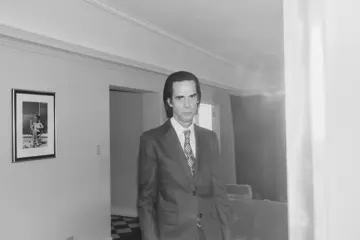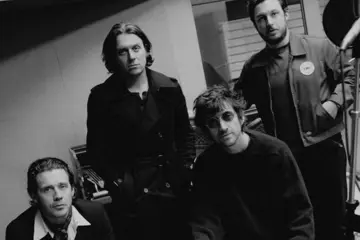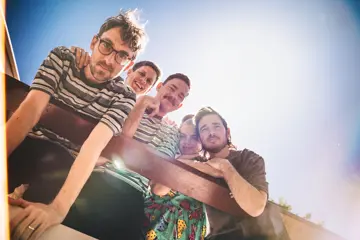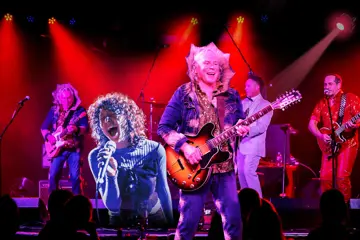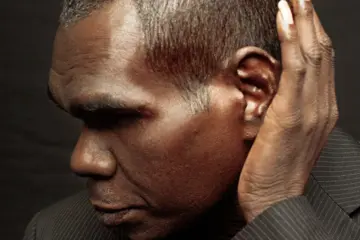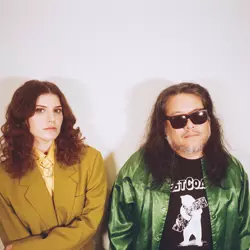 Best Coast
Best CoastDear anonymous internet commentor, so justified in your opinion, so ample in your derision, so smugly callous in your bro-ish ratings of who's hot or not: Bethany Cosentino has read your work, has felt the sting of its cruelty, its judgement, its undeniable undercurrent of misogyny. Though a globe-trottin', chart-botherin', fashion-line-designin', Twitter-ownin' indie queen should pretend to be above the slander of the masses, Cosentino is candid enough to admit that, during her super-swift buzzed-out breakout – during which her 2010 debut, Crazy For You, was met with all manner of hype – the hardest part of the whole thing was dealing with criticism. Little of it constructive. And much of it about how she looks.
“I've changed a lot in the last several years,” says Cosentino, contemplatively. “This band started when I was 22, and I'm 25 now. I've definitely grown up. Physically, I look different; I've started dressing differently, I've grown my hair out, I've stopped getting tattoos. I've definitely changed in more ways than one. It's interesting to go through specific changes, different growth spurts, and having people noticing them and commenting on them.”
Interesting, or horrifyingly dehumanising? “Any woman that makes music is instantly critiqued on what she looks like, and how fat or thin she is,” Cosentino answers. “And it's obviously not only in indie music; this phenomenon totally exists in all of music, for all actors. As a woman, you become this unwitting contestant in some beauty pageant. Like: 'Who's the hottest?' 'That girl's ugly, so I don't like her music!'
“In the beginning, seeing dumb comments written online about my weight, or things about me physically that these anonymous people didn't like, that was definitely like the breaking point for me. I felt like: 'I can't deal with this! Why does it matter what I look like? Can't people just like or not like my music without caring what I look like?' But wishing for that is a fairytale; that's not how the world works. People critique other people all the time every day; people are just mean. You have to just grow a thick skin. Because it doesn't matter. None of that shit matters. It shouldn't matter if I'm 1000 pounds if I'm making cool music. If other people think differently, fuck them. I just have to care about making good music.”
Don't miss a beat with our FREE daily newsletter
Though Cosentino never quite reached the sacrificial status of some Lana Del Rey/Lena Dunham figure, she's definitely dwelt on that Vivian Girlsian tier of garagey indie acts bitched about as if they were bona fide celebrities, Hollywood gossip culture infiltrating the once sexless, respectful realms of indie rock. “It's impossible not to notice that shift, because it's about the way that people live their lives these days. Everything that everybody does is through the internet, and the way that people communicate on the internet is so different to the way they communicate otherwise. Online, everyone is just so obsessed with really gossipy things, and you can easily find yourself the subject of gossip without ever meaning to or thinking that it'd ever happen to you. When I was writing songs in my bedroom, I certainly wasn't imagining that people would suddenly be really interested in who I was dating, or what I looked like; they didn't seem like things that anybody would've cared about it.”
Cosentino may be punk rock girl-made-good – a former member of drone act Pocahaunted who reinvented herself making fuzzed-out, lo-fi, California-pop in her bedroom – but her childhood has signifiers of celebrity. Born and raised in Los Angeles, she was the daughter of a professional drummer, an Italian-American obsessed with Phil Spector, Brian Wilson and legendary Sunset Strip session musicians The Wrecking Crew. Under his influence, little Bethany sang in school musicals and talent shows, ending up appearing in a host of television commercials whilst still a tyke. As an adolescent, she chased after a professional musical career, writing singer/songwritery, coffeehouse pop under the name Bethany Sharaya.
When Cosentino was 19, she was befriended by Amanda Brown, half of LA's awesome Not Not Fun Records, and the two became Pocahaunted, turning out a steady string of voice-looping, guitar-droning incantations steeped in the sounds of Charalambides and the New Weird America. But, eventually, Pocahaunted “just wasn't melodic enough” for its younger half; Cosentino missed working with structured pop songs. After a semester spent in wintry New York studying creative writing, Cosentino dropped out and moved back West. With nothing to do outside of working retail and getting stoned, she had ample time to start a new project and Best Coast was born out of a desire to create classic California pop à la the Everly Brothers and Beach Boys, “something in the vein of straightforward pop music from the '50s and '60s.”
After early, ultra-lo-fi singles like Sun Was High (So Was I) and When I'm With You caught the ears of the blogosphere, Best Coast buzz grew into a wave of praise and Crazy For You – an album recorded by Lewis Pesacov of Afro-indie-pop types Fool's Gold and Foreign Born – dented the US top 30. Yet, for all the critical adulation – including the career-making Best New Music nod from Pitchfork – there was as much of a backlash going back the other way. Cosentino was criticised for the way she looked, for what was seen as unmerited praise, and for the simplicity of her simple pop songs, which lyrics revolved around an on-again/off-again relationship with Nathan Williams, leader of grunge revivalists Wavves. Critiques latched onto the fact that she rhymed “lazy” with “crazy” two separate times, and in one throwaway moment had sung “I wish my cat could talk”, discrediting the music for the simplicity that was, in many ways, its virtue.
“That's what was frustrating. That was the point. I was very consciously writing very simple songs with very simple lyrics. That's the point of Best Coast: it's very simple, straightforward, relatable music. Yet everyone was like, 'She can only [sing] about two things, cats and weed!' That really pissed me off, because I feel like I only mentioned my cat and weed, like, once or twice on the first record. It was really frustrating to deal with people criticising my lyrics, and how simple and repetitive they are. It made me get down on myself as a songwriter, like, 'Am I even good at this? Should I keep doing this?'”
This was the dark side to Best Coast's blessed buzz-band ride, the painful part of life for an otherwise happy citizen of the Twitterverse. “I had a really hard time dealing with criticism,” she admits. “I went from working in a retail shop and selling clothes on eBay to try and pay my rent and buy groceries, and all of a sudden I was a successful professional musician touring the world. To not have ever really experienced people criticising me before, and then to have it happen so suddenly, so publicly, to be criticised by so many people, it hit me a lot harder than I expected it to.”
Difficult Second Albums are often the forums for sentiments such as these, and so it leads us to The Only Place, the “bigger, cleaner-sounding successor” to Crazy For You. Recorded with Fiona Apple/Paul Thomas Anderson offsider Jon Brion (see sidebar), it's a grown-up work that, beyond the obvious pro-California sentiments of its title-track/artwork, finds Cosentino singing about “existential problems” from criticisms to the emptiness of success, the persistence of self-doubts and the homelessness of touring. There's a host more relationship songs and, though she mightn't carol “Go Wavves!” during any of them, this time, listeners will know Williams is the eternal He to Cosentino's She. As much as things may change – hair grown out, Urban Outfitters clothing line released, Hollywood insider as producer, existential angst in the lyrics – the core of Best Coast remains the same.
“My personal life is really out there for people to experience, because it's there in my songs,” Cosentino admits of having a relationship – and a coming-of-age – played out in public. “I don't regret doing that at all, because people can connect on a more personal level with my music... It's unlikely that I'll ever be truly guarded, because my lyrics are so personal, and they'll always be that way. Even if I say 'hey, I'm going to take a step back on Twitter,' my personal life will still be all there in the songs.”
JON BRION-ISMS
Jon Brion – who produced Best Coast's second LP, The Only Place – isn't the standard choice for making an indie-rock record. The composer, arranger, songwriter and mellotron enthusiast has worked with Of Montreal and Spoon, but he's best known for his work with Kanye West, his definitive collaborator is Fiona Apple, and his most choice work – his most Brion-ish compositions – have come with film scores for Eternal Sunshine Of The Spotless Mind, Punch-Drunk Love and I Heart Huckabees.
“I remember, before I even knew who Jon Brion was, seeing those films and thinking 'Man, this soundtrack is really good, who is this?'” recounts Best Coast leader Bethany Cosentino. “I remember when Eternal Sunshine Of The Spotless Mind came out, I bought the soundtrack because I loved it so much. So, years later, thinking that I just made a record with the guy who made that soundtrack, I'm still pretty giddy over it.”
Brion mostly keeps out of Cosentino's way, cleaning up her jangle-pop jams rather than bringing out elaborate orchestrations. The album may be remarkable for how it doesn't sound particularly Brionish. Given most of Best Coast's singles have been recorded by Cosentino's offsider Bobb Bruno, working in the Capitol Records studio in the spaces in Brion's hectic schedule (current work including the scores for Knocked Up sequel, This Is 40, and animated family feature, ParaNorman).
“When we were working with him, he was working on a million different projects at the same time; the guy just lives in his studio. We're very, very, very, very lucky we got to work with him, because he's a very, very, very picky guy. He's really selective about what he spends his time on, so it was a privilege to be in the studio with him.”
Cosentino describes Brion as a “mentor”, an “advice-giver”, someone who taught her professionalism and self-confidence. His best piece of advice came when she was dealing with the standard psychological woes of the dreaded difficult second album. “I was so stressed out making this record, because it was the second record, and I was so concerned about what people were going to think, and Jon would just say 'none of that stuff matters!' [So] one day, I was just like, 'I can't be concerned with what other people think, I just have to focus on making something I'm happy with.' Because, otherwise, if I hadn't done that, I was going to lose my mind. I trusted that Jon wouldn't let us make a shitty record.”

